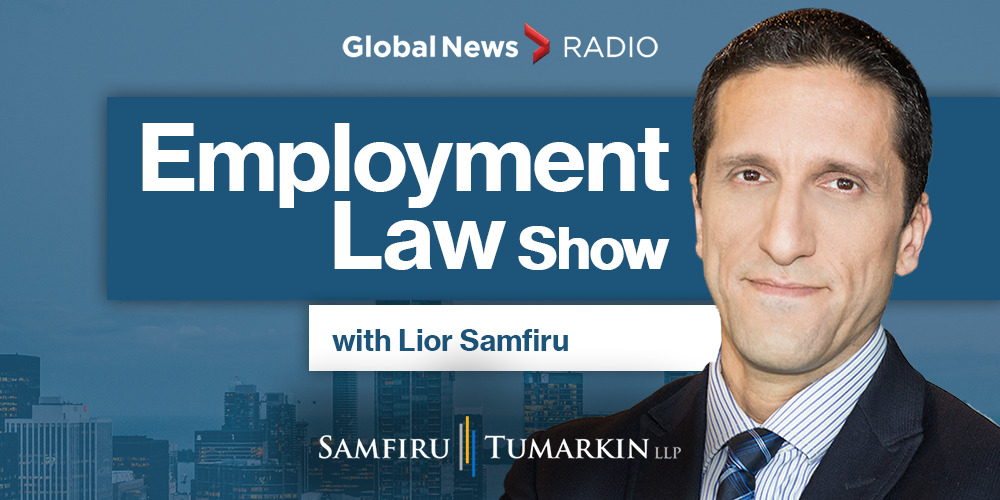Employment Law Show 980 CKNW – S5 E9

Episode Summary
Changes to your job, severance pay in BC, laid off when sick and more on season 5 episode 9 of the Employment Law Show on Global News Radio 980 CKNW in Vancouver.
Listen below as an Employment Lawyer in Vancouver at Samfiru Tumarkin LLP, reveals your workplace rights in British Columbia on the Employment Law Show. We shatter myths and misconceptions about severance pay, terminations, workplace harassment, overtime pay, wrongful dismissal, constructive dismissal, duty to accommodate, and more.
Listen to the Episode
What is a “Constructive Dismissal”?
A constructive dismissal is when an employer decides to make changes to someone’s terms of employment, such as a change to the way your commission is calculated, or a demotion, or a decrease in pay or changes to bonuses. When this happens it’s important not to wait to speak to someone about it. Even waiting two months is too long to wait. In these situations you need to do something right away. This will help you keep your options open.
When my employer makes a change to my job, do I need to get it in writing?
It’s important to be clear with your employer about whether you are accepting any changes to your employment and that includes getting that agreement in writing. You want to be clear about any start and end date to a trial period to changes in your employment. Be clear if you are not accepting this change indefinitely, that way you can go back and discuss the changes with your employer and any issues you may have with it. If you want to consider these changes a termination you can still walk away with a severance package.
If I am offered a severance package, what are the different ways they can be offered?
Severance in B.C. can be offered in the form of working notice or salary continuance. Both scenarios are legal but you do not need to accept them. In both situations there is not necessarily a limit to your severance. In British Columbia, your working notice can be up to 24 months. You may not want to accept either options because they may not represent what you are legally allowed to receive. Salary continuance means you will continue to get your pay for a number of months, but once you find other employment you may only receive 50% of your remaining severance. This presents problems when there is no definition of ‘other employment’. You need to renegotiate the terms so that they are more favourable.
I was recently released from my employment after two years of service, and was given one day’s notice, and offered 2 weeks’ severance. What can I do?
It’s hard to imagine a scenario where there is one day’s notice. If you are curious you can get this package reviewed. If there is no limit to severance laid out in your employment contract it can be negotiated. There are a number of factors that would determine your full service entitlements, so you should get that package reviewed.
If you accept a severance package, does that limit what you can do?
Even a company depositing money in your account does not constitute acceptance of a severance package. They cannot require you to sign a release to get your minimum required amount of severance.
My company recently reorganized the titles of it’s employees, and I am being asked to sign a non-compete clause. What can I do about it?
No employer can force you to sign a contract. If you’re presented with new terms you have a lot of bargaining power. If you don’t want to agree to that non-compete or demotion you can go back to your employer and tell them why you don’t agree. There is nothing they can do to make you sign it if you don’t want to. They can return you to your previous terms or be prepared to terminate you and pay out your severance. You need to decide if you’re prepared to walk away. You need to have your contract reviewed to determine if there is a limit to your severance, and to find out if that can be removed. With respect to the non-compete, you need to be aware about whether it can actually be enforced.They have to be the ones to apply to court if they think you are violating the non-compete clause. Only if they are successful in upholding those terms in your contract will you actually have the limits of a non-compete clause put on you. There is a good chance it won’t be upheld in court.
I was laid off from a construction company. I was called back to work but later became ill, and was laid off again. Can they do that?
You can make a B.C. Human Rights Tribunal Complaint. That is when you are under the protected grounds of illness and disability, and your employer is taking steps that affect your employment on that basis. When you’re cleared medically to come back to work it is your employer’s duty to take you back. It is your right to go back to work. If they prevent you from returning to work that is discrimination based on illness or disability. Speak to your doctor and get a note that says you are cleared to return to work – this is an important step to protect your rights. Send the note to your employer and make a request for them to respond by a certain date. It is their obligation to respond, and you can hold them responsible if they do not.
What can you do when an employer resorts to termination for cause way too early?
There is a process that has to be followed in this case. If you are terminated without notice, and fired right away, that is what is called a ‘just cause termination‘. It does not entitle yo to severance. But there is a process your employer must follow that is a system of progressive discipline. This includes a warning letter, possibly a performance improvement plan, a mutual understanding if there are further problems. After all these steps then they can terminate you with just cause. Just cause means the employee-employer relationship cannot continue. But it is a process before you can terminate with just cause.
I work in the tourism industry, and I have been out of work for the past year. Will I get severance?
First, anyone that is unionized needs to speak to their union because they are under a collective agreement. They need to speak to their union representative to get help. Anyone who is not unionized will have an employment contract with their employer, with specific rights built into it that allow them to lay you off. If they don’t have that written into their contract they have to properly let you know you are terminated. They need to be clear about whether you are laid off or not.




